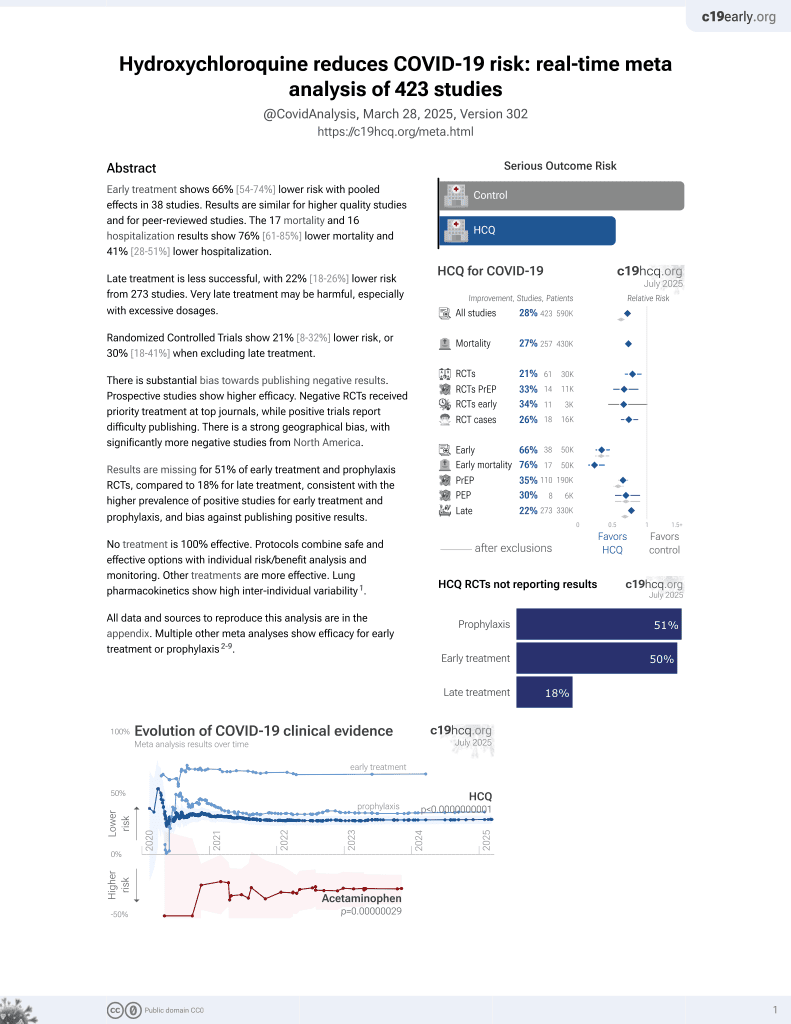Effects of Hydroxychloroquine on Covid-19 in Intensive Care Unit Patients: Preliminary Results
et al., International Journal of Antimicrobial Agents, doi:j.ijantimicag.2020.106136 , Aug 2020
HCQ for COVID-19
1st treatment shown to reduce risk in
March 2020, now with p < 0.00000000001 from 423 studies, used in 59 countries.
No treatment is 100% effective. Protocols
combine treatments.
6,400+ studies for
210+ treatments. c19early.org
|
Small retrospective study of 29 ICU patients comparing those with HCQ plasma concentration within target to those with a concentration below the target value, with no significant differences found. Mortality in the on-target group was 0% versus 17% for the off-target group, mortality relative risk 0.14, p = 0.16.
Lopez et al., 8 Aug 2020, peer-reviewed, 8 authors.
Effects of Hydroxychloroquine on Covid-19 in Intensive Care Unit Patients: Preliminary Results
International Journal of Antimicrobial Agents, doi:10.1016/j.ijantimicag.2020.106136
Since January 2020 Elsevier has created a COVID-19 resource centre with free information in English and Mandarin on the novel coronavirus COVID-19. The COVID-19 resource centre is hosted on Elsevier Connect, the company's public news and information website. Elsevier hereby grants permission to make all its COVID-19-related research that is available on the COVID-19 resource centre -including this research content -immediately available in PubMed Central and other publicly funded repositories, such as the WHO COVID database with rights for unrestricted research re-use and analyses in any form or by any means with acknowledgement of the original source. These permissions are granted for free by Elsevier for as long as the COVID-19 resource centre remains active.
References
Alhazzani, Møller, Arabi, Loeb, Gong, Surviving Sepsis Campaign: guidelines on the management of critically ill adults with Coronavirus Disease 2019 (COVID-19), Intensive Care Med
Bessière, Roccia, Delinière, Charrière, Chevalier et al., Assessment of QT intervals in a case series of patients with coronavirus disease 2019 (COVID-19) infection treated with hydroxychloroquine alone or in combination with azithromycin in an intensive care Unit, JAMA Cardiol
Borba, Val, Sampaio, Alexandre, Melo et al., Effect of high vs low doses of chloroquine diphosphate as adjunctive therapy for patients hospitalized with severe acute respiratory syndrome coronavirus 2 (SARS-CoV-2) infection: A randomized clinical trial, JAMA Netw Open
Bouadma, Lescure, Lucet, Yazdanpanah, Timsit, Severe SARS-CoV-2 infections: practical considerations and management strategy for intensivists, Intensive Care Med
Gautret, Lagier, Parola, Hoang, Meddeb et al., Hydroxychloroquine and azithromycin as a treatment of COVID-19: results of an open-label non-randomized clinical trial, Int J Antimicrob Agents, doi:10.1016/j.ijantimicag.2020.105949
Grasselli, Pesenti, Cecconi, Critical care utilization for the COVID-19 outbreak in Lombardy, Italy: Early experience and forecast during an emergency response, JAMA
Katzen, Kohn, Houk, Ison, Early oseltamivir after hospital admission is associated with shortened hospitalization: A 5-Year Analysis of oseltamivir timing and clinical outcomes, Clin Infect Dis
Lecronier, Beurton, Burrel, Haudebourg, Deleris et al., Comparison of hydroxychloroquine, lopinavir/ritonavir, and standard of care in critically ill patients with SARS-CoV-2 pneumonia: an opportunistic retrospective analysis, Critical Care, doi:10.1186/s13054-020-03117-9
Maa, Chloroquine analogues in drug discovery: new directions of uses, mechanisms of actions and toxic manifestations from malaria to multifarious diseases, J Antimicrob Chemother
Perinel, Launay, Botelho-Nevers, Diconne, Louf-Durier et al., Towards optimization of hydroxychloroquine dosing in intensive care unit COVID-19 patients, Clin Infect Dis
Sanders, Monogue, Jodlowski, Cutrell, Pharmacologic treatments for coronavirus disease 2019 (COVID-19): A Review, JAMA
Yao, Ye, Zhang, Cui, Huang et al., In vitro antiviral activity and projection of optimized dosing design of hydroxychloroquine for the treatment of severe acute respiratory syndrome coronavirus 2 (SARS-CoV-2), Clin Infect Dis
